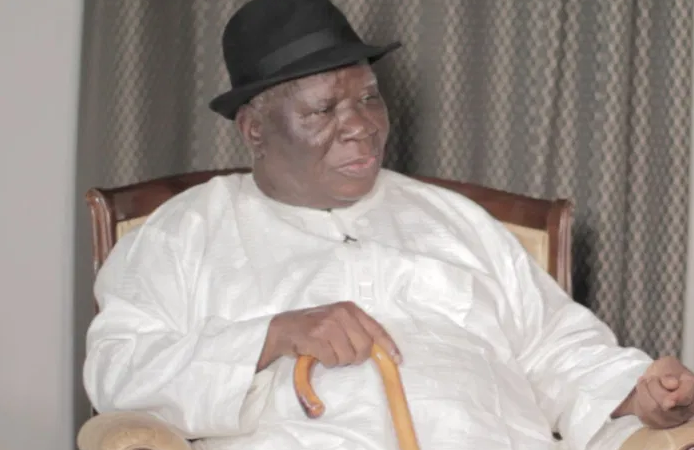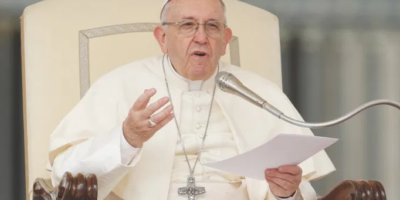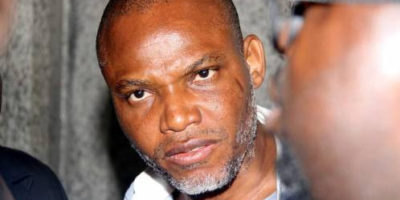Clark: Buhari’s Opposition To Southern Govs’ Ban On Open Grazing, Ill-advised

- Seeks return to 1963 Constitution
A former Federal Commissioner for Information, Chief Edwin Clark, yesterday expressed sadness over President Muhammadu Buhari’s statement criticising Southern governors’ decision to ban open cattle grazing, describing it as ill-advised and unfortunate.
He stated that Buhari’s public opposition to the halt on open grazing by the 17 governors appeared to be giving the impression that he is only the president of Northern Nigeria.
Clark, whose 94th birthday anniversary coincided yesterday with his appearance on ARISE NEWS Channel, said part of the blame should go to the Attorney-General of the Federation (AGF) and Minister of Justice, Mr. Abubakar Malami, for allegedly giving the president wrong legal advice.
He stated that having been a lawyer for 55 years himself, there’s no ground for equating cattle with humans.
He said that even when he was far younger, the herders were around at the time, but wondered why many of them have become gun-wielding criminals, who now kill at will.
People are being maimed, raped, killed, humiliated and dehumanised, yet the president swore an oath to protect the Nigerian citizens and their properties,
he stated.
He said the president’s order for gun-totting herdsmen to be shot on sight had even become confusing, questioning whether since the order was given, none of the herders had been found with deadly weapons.
What I want to advise Mr. President is that he’s the president of Nigeria, including me who voted against him. He’s the president of both his friends and enemies. He has to accommodate everybody,
he said.
Clark urged the president to stop behaving like he’s the leader of only a section of the country, as that runs contrary to the quality a Nigerian president should possess.
That statement is very unfortunate and I will advise him to retract it because the constitution is very clear,
he said.
According to him, while Buhari was voted the president of the country, the 36 governors were also elected to govern their states and therefore not slaves to the central government.
He urged the president to halt any attempt to dictate to elected representatives, adding that this is not a military regime where hierarchy must be obeyed.
Clark stated that although the president has enormous powers in the constitution, boundaries must be maintained, just like it is done in places like America, where Nigeria copied its democracy from.
The president of America does not go about dictating to states. So, all I will advise in order not to cause confusion or create crisis is to let those who oppose the governors’ statement to go to court,
he added.
He said that even if for once the president had not considered it necessary to invite himself and his likes who have been in government at all levels, he should not undermine the role of elders in the country.
He also said that Nigerians were now more aware of their rights and woulf defend themselves if necessary.
He said with the Governor of Benue State, Mr. Samuel Ortom, out of frustration, asking his people to protect themselves, there would be anarchy soon if the situation was not halted.
Clark expressed his support for the ban on open grazing, stressing that it is not just an environmental issue, but a serious national security matter.
He said:
We all support what the 17 governors have stated. I am surprised because even the Vice President (Prof. Yemi Osinbajo) presided over an economic council meeting where they stated that open grazing is dangerous.
Even the Northern governors, particularly the governor of Kano, condemned it. At the governors’ forum presided over by Kayode Fayemi, my son, they condemned it. Or is it because 17 Southern governors issued that statement?
Is that why it is a crime and a questionable issue? When the 19 Northern governors meet, they have never issued any statement against them. It is very unfortunate.
He stated that what the president should have done was to invite the governors to the presidential villa and have a frank discussion with them.
At this juncture, let me say this: Mr President is not an emperor. He’s not a king. He’s not a dictator. He’s a politician and I know during the oil subsidy protest in 2012, the role he played with Ahmed Tinubu, which nearly brought Goodluck Jonathan’s government down.
But today, subsidy is being operated in secrecy. We don’t know what’s happening. He should listen to Nigerians. We are his citizens,
he said.
Clark also called for the replacement of the 1999 Constitution, as amended, with the 1963 Constitution.
According to him, the 1963 Constitution is a wholly-made Nigerian document and it operated effectively until during the civil war when the military government suspended it.
He described some parts of the country as having been reduced to “crumb eaters” due to some of the provisions of the 1999 Constitution.
He also rejected calls for secession by some separatist groups.
He said:
That’s why we have said that for Nigeria to survive, we must restructure this country. If we don’t restructure, it will kill us.
He stated that he wasn’t a proponent of secession and he won’t leave Nigeria for anybody.
Clark stated that as being practised today, Nigeria has a unitary constitution whose operators are mainly from the North, even dominating ministries like that of the Niger Delta Affairs.
He added that although former President Goodluck Jonathan did not have enough time when he was in office, he came up with the national conference, which agreed on restructuring.
The South-south leader, however, stated that the national conference report has since been dumped by the Buhari administration.
Clark said he had followed different governments closely for 70 years, noting that even the North threatened secession after the late Anthony Enahoro raised the motion for independence in 1953.
While calling for mutual respect for all citizens, he said the country must practice federalism in its true form to address many of the problems confronting the nation.

Justin Nwosu is the founder and publisher of Flavision. His core interest is in writing unbiased news about Nigeria in particular and Africa in general. He’s a strong adherent of investigative journalism, with a bent on exposing corruption, abuse of power and societal ills.













